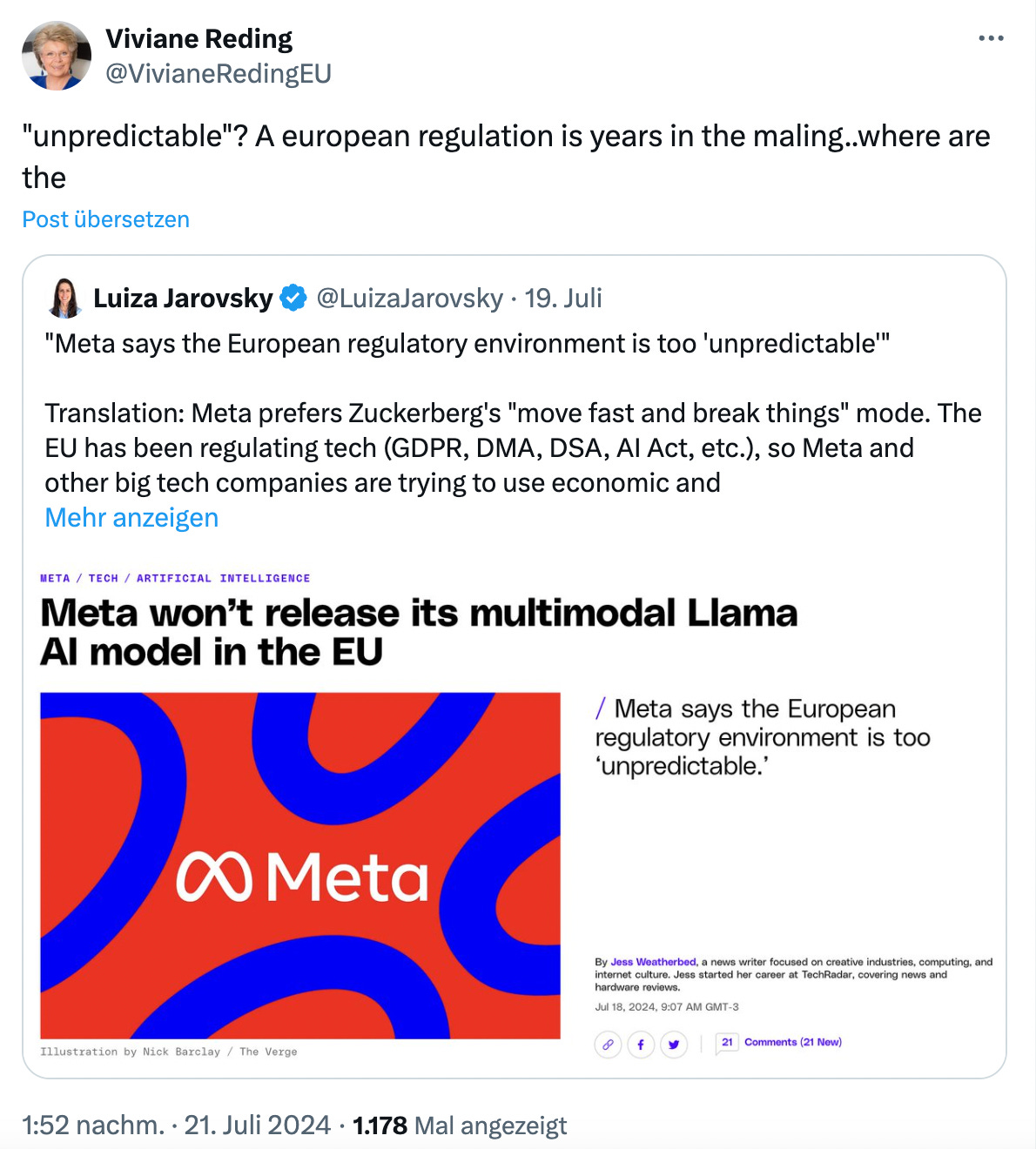Europe at a digital crossroads: Balancing regulation and technological progress
As concerns grow about Europe's AI readiness, are EU tech rules protecting citizens or obstructing growth?

In her bid to get confirmed as President of the European Commission, Ursula von der Leyen claimed that the “insufficient diffusion of digital technologies” is one reason for the lack of competitiveness of the European economy. Yet, the announcement of both Apple and Meta to delay the launch of their AI features in Europe due to regulatory uncertainty signal that the diffusion of the next generation of digital technologies will not happen more swiftly.
Quickly, two different interpretations emerged: The first stated that the EU’s regulatory zeal is a risk to the continent’s competitiveness and the second that the rules of the game in the EU are clear and that companies simply do not want to comply.
Europe's decade of regulation
Not surprisingly, EU regulators and lawmakers primarily belong to the latter camp. This is former Vice President of the European Commission Viviane Reding:

Importantly, it seems that Meta’s comments about regulatory uncertainty did not refer to the newly enacted EU Artificial Intelligence Act (AI Act), but the block’s privacy rules. The company recently complied with a request to stop training its models on data of European users, but according to Meta’s VP of Policy Rob Sherman, the company would not “be able to serve European consumers properly” without the ability to train on European data.
The uncertainty of EU tech rules
Even people involved in the negotiation of the AI Act like Kai Zenner have criticised that during the final 36-hours negotiation marathon, “Time pressure led to an outcome where many things remain open. Regulators couldn’t agree on them and it was easier to compromise. It was a shot in the dark”.
This includes guidance on the use of personal data for AI training. In recent months, Data Protection Authorities across Europe have published position papers and guidances that range from liberal (like this position paper) to extremely restrictive. Given the fines attached to violations of the EU’s General Data Protection Regulation (GDPR), the financial risk is big, especially for large firms.
Benedict Evans explained the dilemma nicely in his newsletter (No. 550, 23 July 2024):
There is a narrow story here about highly specific legal issues, but the broader issue is that the EU has written some very broad and complex laws that have a lot of scope for interpretation and ‘creep’ over time, so that companies might think they’re complying with the law, but then get a billion dollar fine they weren’t expecting, and a demand to redesign their proposition. I don’t remember anyone reading GDPR and saying that this would oblige Meta to provide its services to the EU without any interest-based advertising, for example, yet that’s where the EU has ended up. One of the tensions of regulatory practice is between setting general principles (so you don’t need thousands of individual laws) and predictability and standardisation, and the EU might have swung too far.
Is the “Brussels effect” losing its grip?
This has two potentially dramatic consequences: If companies continue to delay (or even cancel) the launch of their most powerful AI models in Europe, European firms will have to work with lower quality models and won’t be able to reap the benefits of AI to the same extent as other countries can. This will further increase the GDP gap between the US and Europe.
And European companies may not be able to fill the gap: Elisabeth L’Orange, co-founder of AI firm Oxolo recently announced that her company pivoting because of regulatory challenges (Oxolo’s AI generated videos would be labelled as deepfakes under the AI Act) and a slow adoption of new technologies in European companies.
Secondly, it seems that recent years have shown that a tougher macroeconomic environment and high compliance costs might have clipped the wings of the “Brussels effect”, i.e. the assumption that stricter European regulatory norms will be adopted globally.
It is often assumed (especially by EU officials), that the global adoption of European norms is a more or less automatic process, but that was of course never the case.
The Brussels effect is tied to Europe's economy power
First of all, the rules need to be clear: The EU often claims that they are “open for business” for every company that wants to be present in Europe and adheres to local laws. But when the law is unclear, there can by definition be no “Brussels effect”.
Companies may also think they are forced to “fork” their software and produce a “localised” version solely for European users. This however fundamentally changes the economics of tech businesses.
In his newsletter Stratechery, tech analyst Ben Thompson has repeatedly pointed out that firms like Meta earn significantly less money per user in the EU compared to the US and yet, the most important European tech laws calculate fines not on the basis of European, but global turnover:
This is the point, though: the E.U.’s worldwide regulatory power is ultimately derived from the structure of technology, and structures can change. This is where that ten-percent-of-worldwide-revenue figure looms large: it fundamentally changes the calculus in terms of costs. Fines from a regional regulator are not the equivalent of engineering and server costs that you’re already paying, so you might as well capture pennies of extra revenue from said region; they are directly related to revenue from that region. In other words, they are more like marginal costs: the marginal cost of serving the E.U. is the expected value of the chance you will get fined more than you earned in any given year, and for big tech that price is going up.
If you add the costs of forking (and maintaining) an EU version for your product, coupled with a smaller return per user and the potential of fines based on your global turnover, it is not difficult to imagine that companies may think twice before launching a high-end product in Europe in the future.
Europe needs to do better: A recent analysis by the Centre for European Research (CER) finds that the Brussels effect might still prevail as long as EU regulations “focus on benefiting consumers, keeping Europe’s markets open and not forcing firms into EU-specific business practices”. Europe needs to find better ways to regulate and it cannot source out its competitiveness to regulators — it needs to become more innovative on its own.




